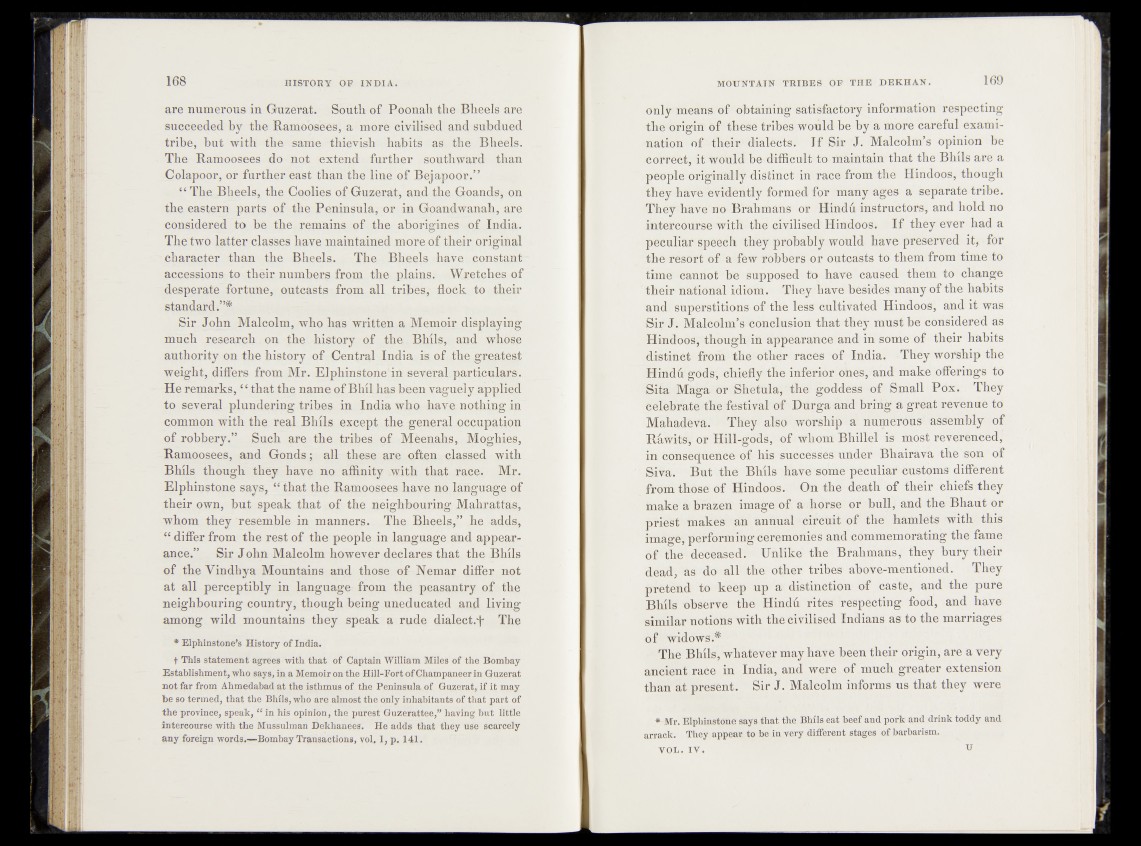
are numerous in Guzerat. South of Poonah the Bheels are
succeeded by the Ramoosees, a more civilised and subdued
tribe, but with the same thievish habits as the Bheels.
The Ramoosees do not extend further southward than
Colapoor, or further east than the line of Bejapoor.”
“ The Bheels, the Coolies of Guzerat, and the Goands, on
the eastern parts of the Peninsula, or in Goandwanah, are
considered to be the remains of the aborigines of India.
The two latter classes have maintained more of their original
character than the Bheels* The Bheels have .constant'
accessions-to their numbers from the plains. Wretches of
desperate fortune, outcasts from all tribes,' flock to their
standard.”*
Sir John Malcolm, who has written a Memoir displaying
much research, on the history of the Bhils, and whose
authority on the history of Central India is of ,the greatest
weight, differs from Mr. Elphinstone’in several particulars.
He remarks, “ that the name of Bhil has been vaguely applied
to several plundering tribes in India who have nothing in"
common with the real Bhils except the general occupation
of robbery.” Such are the tribes of MOenahs, Moghies,
Ramoosees, and Gonds; all these are often classed with
Bhils though they have no affinity .with that race. Mr.
Elphinstone says, “ that the Ramoosees have no language of
their own, but speak that of the neighbouring Mahrattaa,
whom they resemble in manners. The Bheelg,” he -adds,
“ differ from the rest of the people in language and appearance.”
Sir John Malcolm however declares that the Bhils
of the Yindhya Mountains and those of-Nemar differ not
at all perceptibly in language from the peasantry of the
neighbouring country, though being uneducated and living
among wild mountains they speak a rude dialect.f The
* Elphinstone’s History of India.
t This statement agrees with that of Captain William Miles of the Bombay
Establishment, who says, in a Memoir on the Hill-Fort of Champaneer in Gluzerat
not far from Ahmedabad at the isthmus of the Peninsula of Guzerat, if it may
be so termed, that the Bhils, who are almost the only inhabitants of that part of
the province, speak, “ in his opinion, the purest Guzerattee,” having but little
intercourse with the Mussulman Dekhanees. He adds that they use scarcely
any foreign words.-—Bombay Transactions, vol. I, p. 141.
only means of obtaining satisfactory information respecting
the origin' of these tribes would be by a more careful examination
of their dialSets; If Sir J. Malcolm’s opinion be
correct, it would bedifficult to maintain that the Bhils are a
people original]ÿ distinct 4n race from the Hindoos, though
they have, evidently-formed for many ages a separate tribe.
They have no Brahmans or Hindh instructors, and hold no
intercourse with the civilised Hindoos. If they ever had a
peculiar speech they probably would have preserved it, for
the resort of a -few robbers or outcasts to them from time to
time-cannot be supposed flo have* caused them to change
their national idfom. They‘have besides, many of the habits
and superstitions of the less cultivated Hindoos; and it was
Sir J. Malcolm’s conclusion that they must be considered as
Hindoos, thoughdn appearance and1 in- some of their habits
distinct from th#? other races of India. They worship the
Hind4lgods^ chiefly the inferior oiies, and make offerings to
Sita Maga. or SÉ^tela^'the goddess of Small Pox. They
celebratë*t'heifèstival of Durgaand bring a great revenue to
Mahadëva. They also worship a numerous1 assembly of
Rawk% or Hill-gods, of whom Bhlllel is most’reverenced,
in Consequence of his successes under Bhairava the son of
Sita. But the Bhils have some peculiar customs different
from those of Hindoos. On the death of their chiefs they
make a brazen image of a horse or bull, and the Bhaut or
priest makes an annual circuit of the hamlets with this
image, performing ceremonies and cômmemorating the fame
of the deceased. Unlike the Brahmans, they bury their
dead, as do all the other tribes above-mentioned. They
pretend to keep up a distinction of caste, and the pure
Bhils observe the Hindfl rites respecting food, and have
similar notions with the civilised Indians as to the marriages
of widows.*
The Bhils, whatever may have been their origin, are a very
ancient race in India, and were of much greater extension
than at present. Sir J. Malcolm informs us that they were
*-Mr. Elpbinstbne says that the Bhils eat beef and pork and drink toddy and
arrack. They appear to be in very different stages of barbarism.
VOL . IV. U